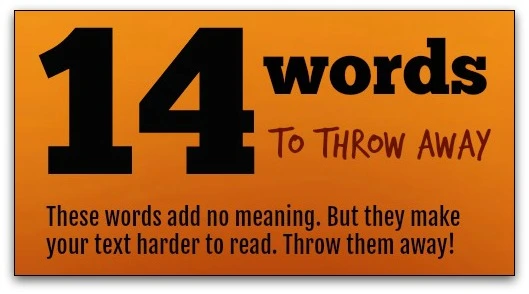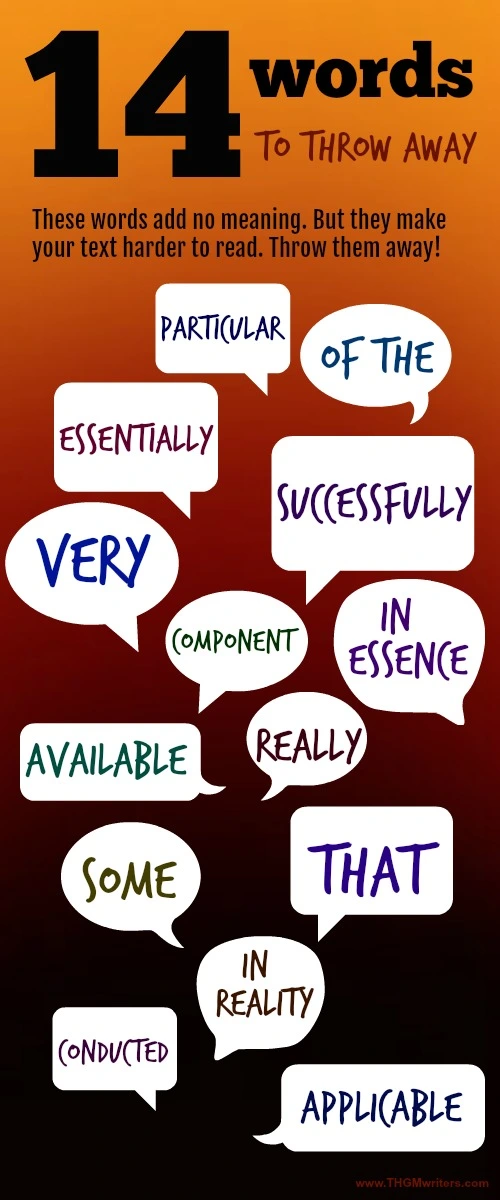Sometimes we throw in extra words that add nothing to the meaning of what we are writing. They make it harder to read your article, book or report. Here are some of the most useless words in the English language.
In a rush? Go straight to the “14 Most Useless Words” Infographic
If you want to be clearly understood, write in plain English. Don’t use big words just to sound important. And don’t throw in these useless words that add nothing to the meaning of the sentence.
Just throw them away!
Available
This useless word gets thrown into sentences all the time. Here are two ways it is thrown in for no good reason:
- “This report is available with…” No, no, no. Instead, you can say “This report has…”. It’s much shorter and to the point.
- “The line staff processed the available documents.” Hold on…they processed only the available ones? Really? Why didn’t they also process the unavailable ones? You see, there is no reason to specify that they processed the available documents.
Throw it away!
Applicable
This is another useless word thrown into sentences in two ways similar to “available”.
- “These regulations are applicable to…” No, no, and again no. It’s much clearer to say “These regulations apply to…”.
- “Please fill in the applicable forms.” Hold on…why fill in only the applicable ones? Why not also fill in the inapplicable ones? Again, there is no reason to specify “applicable”, because those are the only forms anybody would fill in.
Throw it away!
Very
Most of the time, we use this word as an extra exclamation mark. For instance, “I was very upset.” In what way is this different than “I was upset”? If what you mean to say is “I was fuming,” say it. As for “very”…throw it away!
That
As useful as it can be in some cases, we throw “that” into sentences that really don’t need the word.
- We wish that there was more time to play.
- I saw that there was a need for my services.
- They knew that they were the best team.
Each of these sentences reads better without the “that”. Throw it away!
In reality
People throw this useless pair of words into a sentence to say that what they are saying is true.
Sometimes, they use it to contrast with an imagined truth. For instance, “I thought that they were angels, but in reality, they were aliens.” Hat tip to Styx. In such cases, there might be a reason to use “in reality”. Even so, read that sentence again without “in reality”. The more succinct sentence still works, so it’s your choice.
Other times, people throw “in reality” into a sentence where there is no contrast with the imagination. In those cases, it is just underbrush blocking the reader’s path. Take a machete to it. Throw it away!
Really
And the word “really”, do we really need it? I mean, do we need it? Some people throw the word into sentences, but nobody can really explain why. In fact, nobody can explain why. Do we really need “really”? Throw it away!
Essentially or in essence
These useless words get thrown into so many sentences. There is such a simple test for this. Read the sentence without these words to see if it makes sense. It always does. Unless you are comparing the essence of something to its non-essence, the word has no use. And when was the last time you did that? Throw it away!
This applies equally to “basically”, by the way.
Some
“I began to take some interest” can just as easily be said as “I began to take interest”. “I ate fruit for breakfast” is more to the point than “I ate some fruit for breakfast”.
“Some” adds no meaning, because it means an unspecified quantity. The “some” is implied by simply not specifying the quantity. No need to include the “some”. Some is one of the most useless words in English. Throw it away!
Of the
These two little words very often are just extra verbiage. Compare these two sentences:
- Most of the students quiet down when the teacher enters the room.
- Most students quiet down when the teacher enters the room.
“Of the” is often not needed. Throw it away!
Particular
This particular useless word is often not needed. In fact, this word is not needed. Two sentences. Same meaning. It’s not a particularly useful word. Throw it away!
Component
This word often appears before “part”, as in: “We divided the component parts.”
Component means part. Writing “component part” makes as much sense as writing “fabric cloth” or “location place”. So stick with “part” on its own: one syllable in one word, instead of four syllables in two words. Throw it away!
Conducted
People often place this word after something they’ve conducted. In most cases, that something exists only because it has been conducted. For instance:
- Most experiments conducted showed that…
- Marks were higher this year on the exams conducted.
Since the exam would not be an exam without being conducted, no need to specify that it was conducted. It’s not an experiment until it is conducted. Throw it away!
Successfully
OK, this gets my vote for most useless word in English.
- We successfully completed the installation.
- They successfully hired more bakers.
- The surgeon successfully transplanted his own brain.
If it had not been successfully completed, it would not have been completed at all. If the brain had slipped to the floor, it would not have been a successful brain transplant, and therefor it would not have been a transplant. No need to say it was successfully completed.
As for the brain… Throw it away!
Remember that when you write, people have to read. Don’t torture them with useless words they have to skip over or trip over. Else, they might choose to stop reading, and then you’ve wasted your time writing.
Remove the useless words from your reader’s path. Throw them away!
- More great tips in our Plain Language Writing Guide
Tap or click here for permission to republish this Infographic.




You forgot the bane of an editor’s existence: “Nowadays” and “in this day and age”. Yuch.
Great information, David. I actually come by your site because I see you on most of the sites I’ve visited. So I came over to read your post. In fact, I use some of these words in my posts. Now I know better.
Thanks for sharing.
“Very” is the classic one people say not to use. Some people say not to ever use adverbs, either.
Excellent David. Need to pass this onto the young ‘uns!
Hi David,
Great article David loved it thanks for sharing
I would add the word “Just.” 9 times out of ten it is useless. Find a sentence with it, say it without it, and you will understand that the word is usually not JUSTified.
Hi David,
This is really a great alert to the people like me.
Good to note these useless!!! words.
I use to use some of them, and now I realize the seriousness!
I tweeted and shared.
Keep sharing. I am here from the other post the latest alert on
using other 33 words.
Thanks, Dave, this is really useful to all writers and readers.
Thanks again for this wonderful shout out.
~ Phil
I questioned “that” a while back. Thanks for confirming i.t
What about ALREADY? as in “I have already seen it” Useless.
Hi David,
Can I use a latin word “versus” in Phd these like for example: Electroacoustic stimulation versus natural hearing?
Thanks in advance.